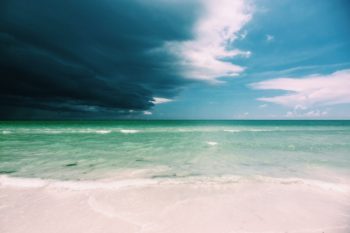Natural Disasters Worry Even Experienced Travelers
 David Yee’s award-winning play, carried away on the crest of a wave, is a series of vignettes centered on the 2004 Indian Ocean tsunami. The moving stories of loss and strife are presented from the point of view of locals and tourists alike. And it’s evident that the impact of natural disasters always lingers for everyone who was there.
David Yee’s award-winning play, carried away on the crest of a wave, is a series of vignettes centered on the 2004 Indian Ocean tsunami. The moving stories of loss and strife are presented from the point of view of locals and tourists alike. And it’s evident that the impact of natural disasters always lingers for everyone who was there.
There are few circumstances that travelers fear more than a natural disaster. And their concerns run much deeper than the worry of losing a travel investment. As Yee’s play demonstrates, nothing matters to travelers like safety and well-being of family and friends. Of course, nothing can prevent natural disasters from happening. But the right insurance company can enhance your peace of mind and give valuable, practical assistance when the worst happens.
Travel Insurance: What IS a Natural Disaster?
The 2004 Indian Ocean tsunami was indisputably a true natural disaster, but the term “natural disaster” isn’t always clear. Travel cancelation insurance and trip interruption insurance exclude “known events”. Known events include hurricanes that have been named, storms that have been formally forecasted, and volcanic eruptions in progress. Here’s another way to look at it: Travel insurance only covers things that are unlikely to happen. A natural disaster that everyone knows is about to happen isn’t eligible for most forms of travel insurance.
When it comes to definitions of natural disasters, it’s important to note that some travel insurance providers exclude certain disasters. Some, like volcanic eruptions or avalanches, are labeled “Acts of God”. Savvy travelers should clarify with their insurance provider exactly what is and is not included in their coverage.
Bad Weather and Natural Disasters Aren’t the Same.
Travel insurance coverage for natural disasters also distinguishes between true disasters and simply poor weather. Unexpected storms can cause chaotic delays and be a source of great irritation, but they aren’t in the same category as a true natural disaster. Fortunately, many companies also sell travel delay coverage which can provide travelers with support and compensation in the event of a costly interruption regardless of circumstances.
Timing and Duration Matters
Natural disaster coverage is dictated in part by the timing and circumstances of your trip. For instance, some trip cancellations policies are designed to help only when more than 50% of a trip is affected by the interruption. If disaster strikes on the last day, you’ll won’t be compensated for the previous 90% of your travels that went off without a hitch.
Timing also matters when it comes to travel warnings and advisories. These bulletins from the State Department and other authorities are critical pieces of evidence when determining if trip cancellation insurance is applicable to natural disasters. But these warnings must remain in effect and be valid on the day you were planning to depart. A travel advisory that concludes a week before your trip is unlikely to help you refund a canceled trip even if your destination is still recovering from a natural disaster.
When Disappointment and Disaster Meet
Remember, travel insurance is a means of support and assistance for when a situation becomes uninhabitable, not for when things are different from what you expected. If the resort pool has been shut down for repairs post-hurricane or a horrible snow storm means your flight is canceled and the airline hires a bus, these unpleasant circumstances wouldn’t normally be covered under the umbrella of natural disaster coverage. Your trip was safe and generally uninterrupted, even if it wasn’t what you expected.
Thankfully, true natural disasters are rare and the majority of travelers will never experience one. Fortunately, should the worst happen, understanding your policy and knowing what’s included will give you confidence and reassurance under the most trying of circumstances.
Protect Your Trip: Buy Trip Cancellation Insurance for Travelers
